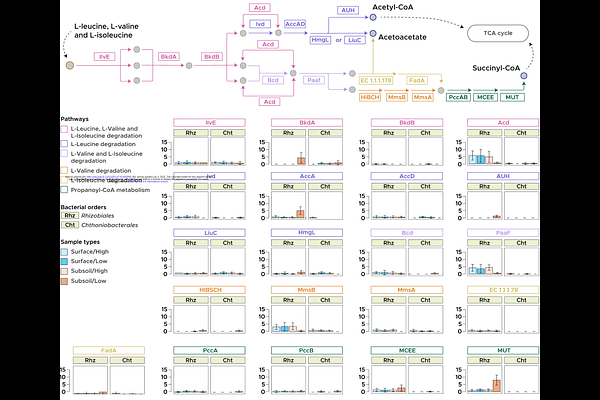Continental-scale integration of soil metagenomes and metabolomes reveals ubiquitous microbial capacity for recalcitrant carbon decomposition.

Continental-scale integration of soil metagenomes and metabolomes reveals ubiquitous microbial capacity for recalcitrant carbon decomposition.
Song, Y. C.; Shi, C.; Stratton, K. G.; Stohel, I.; Freire-Zapata, V.; Tfaily, M. M.; Eloe-Fadrosh, E. L.; Graham, E. B.
AbstractSoil organic matter (SOM) decomposition by microorganisms represents the largest uncertainty in predicting terrestrial carbon-atmosphere feedbacks. Yet, we lack systematic understanding of the microbial taxa that drive decomposition of chemically distinct carbon pools and of the metabolic pathways they employ across environmental gradients. Here, we address this critical gap using the first continental-scale soil dataset pairing shotgun metagenomes with high-resolution molecular characterization of SOM chemistry. We use data from 109 standardized soil cores across the United States to assemble 0.76 terabases (Tbs) of prokaryotic metagenome-assembled genomes (344 MAGs) and identify 66,727 distinct SOM molecules, integrating these datasets to reveal widespread microbial potential for depolymerizing recalcitrant carbon compounds previously considered stable. Notably, we uncover complementary metabolic specialization between two abundant bacterial orders, Rhizobiales and Chthoniobacterales. This metabolic partitioning is consistent across soil depths and activity levels, suggesting coordinated decomposition of chemically complex carbon through distinct but complementary biochemical strategies. The metabolic potential for depolymerization of recalcitrant compounds is supported by the abundance of these molecules across the soils, as indicated by Fourier-Transform Ion Cyclotron Resonance Mass Spectrometry (FTICR-MS), and by flux balance analysis of metabolic models. Our continental-scale integration of microbial genotypes with their chemical substrates reveals that a substantial fraction of SOM previously considered recalcitrant harbors decomposition potential that current Earth system models fail to capture. These findings provide mechanistic insight for incorporating microbial metabolic pathways into carbon cycle predictions and highlight an underappreciated vulnerability of soil carbon to environmental variability.